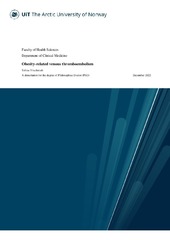| dc.contributor.advisor | Morelli, Vania Maris | |
| dc.contributor.author | Frischmuth, Tobias | |
| dc.date.accessioned | 2023-02-08T22:36:59Z | |
| dc.date.available | 2023-02-08T22:36:59Z | |
| dc.date.embargoEndDate | 2028-02-22 | |
| dc.date.issued | 2023-02-22 | |
| dc.description.abstract | Venous thromboembolism (VTE), a collective term for deep vein thrombosis (DVT) and
pulmonary embolism (PE), is a common and multicausal disease. Obesity is a major and
likely causal risk factor for VTE. However, to what extent obesity contributes to VTE risk in
the general population and the mechanism of obesity-related VTE remain poorly understood.
The overall aim of this thesis was (i) to determine the risk of VTE attributed to obesity at
population level and (ii) to reveal biomarkers of obesity-related VTE.
The study population in all papers was recruited from the 4th-7th surveys of the Tromsø
Study (enrolment: 1994-2016), a population-based cohort study. Paper II also included
participants from the Trøndelag Health Study (HUNT 2). Exposure information was obtained
at survey inclusion through self-administered questionnaires, physical examination, and blood
samples. Incident VTE events during follow-up were registered and objectively validated.
In paper I, to assess the VTE risk attributed to overweight and obesity, we calculated
the population attributable fraction (PAF) using a cohort design and repeated measurements
of body mass index (BMI). The PAF of incident VTE due to overweight (BMI 25-30 kg/m2)
and obesity (BMI ≥30 kg/m2) was 24.6% (12.9% was attributed to overweight and 11.7% to
obesity). In paper II, the joint effect of obesity and established prothrombotic genotypes
(rs8176719 in ABO, rs6025 in F5, rs1799963 in F2, rs2066865 in FGG, and rs2036914 in
F11) on VTE risk was investigated. Using a case-cohort design, it was observed that the
combination of obesity and prothrombotic genotypes, assessed either individually or as a
genetic risk score, had an additive effect on VTE risk (i.e., no biological interaction).
However, the combination of obesity and some prothrombotic genotypes appeared to have a
supra-additive effect on the risk of DVT and unprovoked VTE. In papers III and IV, a nested
case-control design was used to investigate whether plasma leptin and plasminogen activator
inhibitor-1 (PAI-1) were associated with VTE risk and their potential to mediate the VTE risk
in obesity. The VTE risk increased with increasing levels of leptin, and particularly of PAI-1.
Additional adjustment for BMI markedly attenuated risk estimates for leptin, while PAI-1
remained associated with VTE. In a mediation analysis, PAI-1 mediated almost 15% of the
VTE risk in obesity, while no apparent mediation was observed for leptin.
In conclusion, the main findings of this thesis indicate that obesity is a major risk factor
for VTE at population level and that PAI-1 levels mediate part of the VTE risk in obesity. | en_US |
| dc.description.doctoraltype | ph.d. | en_US |
| dc.description.popularabstract | Venous thromboembolism (VTE), a collective term for deep vein thrombosis (DVT) and
pulmonary embolism (PE), is a common and multicausal disease. Obesity is a major and
likely causal risk factor for VTE. However, to what extent obesity contributes to VTE risk in
the general population and the mechanism of obesity-related VTE remain poorly understood.
The overall aim of this thesis was (i) to determine the risk of VTE attributed to obesity at
population level and (ii) to reveal biomarkers of obesity-related VTE.
The study population in all papers was recruited from the 4th-7th surveys of the Tromsø
Study (enrolment: 1994-2016), a population-based cohort study. Paper II also included
participants from the Trøndelag Health Study (HUNT 2). Exposure information was obtained
at survey inclusion through self-administered questionnaires, physical examination, and blood
samples. Incident VTE events during follow-up were registered and objectively validated.
In paper I, to assess the VTE risk attributed to overweight and obesity, we calculated
the population attributable fraction (PAF) using a cohort design and repeated measurements
of body mass index (BMI). The PAF of incident VTE due to overweight (BMI 25-30 kg/m2)
and obesity (BMI ≥30 kg/m2) was 24.6% (12.9% was attributed to overweight and 11.7% to
obesity). In paper II, the joint effect of obesity and established prothrombotic genotypes
(rs8176719 in ABO, rs6025 in F5, rs1799963 in F2, rs2066865 in FGG, and rs2036914 in
F11) on VTE risk was investigated. Using a case-cohort design, it was observed that the
combination of obesity and prothrombotic genotypes, assessed either individually or as a
genetic risk score, had an additive effect on VTE risk (i.e., no biological interaction).
However, the combination of obesity and some prothrombotic genotypes appeared to have a
supra-additive effect on the risk of DVT and unprovoked VTE. In papers III and IV, a nested
case-control design was used to investigate whether plasma leptin and plasminogen activator
inhibitor-1 (PAI-1) were associated with VTE risk and their potential to mediate the VTE risk
in obesity. The VTE risk increased with increasing levels of leptin, and particularly of PAI-1.
Additional adjustment for BMI markedly attenuated risk estimates for leptin, while PAI-1
remained associated with VTE. In a mediation analysis, PAI-1 mediated almost 15% of the
VTE risk in obesity, while no apparent mediation was observed for leptin.
In conclusion, the main findings of this thesis indicate that obesity is a major risk factor
for VTE at population level and that PAI-1 levels mediate part of the VTE risk in obesity. | en_US |
| dc.description.sponsorship | The Thrombosis Research Center has received an independent grant from Stiftelsen Kristian Gerhard Jebsen. T. Frischmuth was supported by the Northern Norway Regional Health Authority. | en_US |
| dc.identifier.uri | https://hdl.handle.net/10037/28520 | |
| dc.language.iso | eng | en_US |
| dc.publisher | UiT The Arctic University of Norway | en_US |
| dc.publisher | UiT Norges arktiske universitet | en_US |
| dc.relation.haspart | <p>Paper I: Frischmuth, T., Tøndel, B.G., Brækkan, S.K., Hansen, J.B. & Morelli, V.M. The risk of incident venous thromboembolism attributed to overweight and obesity: The Tromsø Study. (Submitted manuscript).
<p>Paper II: Frischmuth, T., Hindberg, K., Gabrielsen, M.E., Brumpton, B., Hveem, K., Brækkan, S.K., Hansen, J.B. & Morelli, V.M. (2022). Joint Effect of Multiple Prothrombotic Genotypes and Obesity on the Risk of Incident Venous Thromboembolism. <i>Thrombosis and Haemostasis, 122</i>(2), 267-276. Published version not available in Munin due to publisher’s restrictions. Published version available at <a href=https://doi.org/10.1055/a-1497-9777>https://doi.org/10.1055/a-1497-9777</a>. Accepted manuscript version available in Munin at <a href=https://hdl.handle.net/10037/24422>https://hdl.handle.net/10037/24422</a>.
<p>Paper III: Frischmuth, T., Hindberg, K., Aukrust, P., Ueland, T., Brækkan, S.K., Hansen, J.B. & Morelli, V.M. (2022). Plasma Levels of Leptin and Risk of Future Incident Venous Thromboembolism. <i>Thrombosis and Haemostasis, 122</i>(4), 560-569. Published version not available in Munin due to publisher’s restrictions. Published version available at <a href=https://doi.org/10.1055/s-0041-1732295>https://doi.org/10.1055/s-0041-1732295</a>. Accepted manuscript version available in Munin at <a href=https://hdl.handle.net/10037/23877>https://hdl.handle.net/10037/23877</a>.
<p>Paper IV: Frischmuth, T., Hindberg, K., Aukrust, P., Ueland, T., Brækkan, S.K., Hansen, J.B. & Morelli, V.M. (2022). Elevated plasma levels of plasminogen activator inhibitor-1 are associated with risk of future incident venous thromboembolism. <i>Journal of Thrombosis and Haemostasis, 20</i>(7), 1618– 1626. Also available in Munin at <a href=https://hdl.handle.net/10037/26780>https://hdl.handle.net/10037/26780</a>. | en_US |
| dc.rights.accessRights | embargoedAccess | en_US |
| dc.rights.holder | Copyright 2023 The Author(s) | |
| dc.rights.uri | https://creativecommons.org/licenses/by-nc-sa/4.0 | en_US |
| dc.rights | Attribution-NonCommercial-ShareAlike 4.0 International (CC BY-NC-SA 4.0) | en_US |
| dc.subject | Venous thrombosis | en_US |
| dc.subject | Venous thromboembolism | en_US |
| dc.subject | Deep vein thrombosis | en_US |
| dc.subject | Pulmonary embolism | en_US |
| dc.subject | Obesity | en_US |
| dc.subject | Overweight | en_US |
| dc.title | Obesity-related venous thromboembolism | en_US |
| dc.type | Doctoral thesis | en_US |
| dc.type | Doktorgradsavhandling | en_US |


 English
English norsk
norsk


